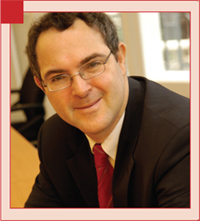

- Pierre Fersztand
- Global Head of Cash Management, Payments, Trade Solutions & Factoring, BNP Paribas
An Executive Interview with Pierre Fersztand, Global Head of Cash Management, BNP Paribas
What reasons do we have to be optimistic about 2015?
 We are definitely seeing a more positive outlook amongst our customers. Treasurers have taken considerable steps to rationalise their cash management structures and processes, optimise liquidity and position their business for growth both in their home regions and overseas, which is contributing to greater optimism about their ability to manage the inevitable uncertainty ahead. There are, of course, considerable differences in economic conditions in different parts of the world. Asia continues to grow strongly but steadily, there is a definite recovery in the US and the UK, but ongoing difficulties in the Eurozone will mean another flat year ahead. Over the past five to six years, however, company boards and the treasurers that support them have become accustomed to, and prepared for, economic diversity across regions, and have adapted and expanded their business strategies to take advantage of opportunities that exist in their home markets, but also those in faster-growing economies.
We are definitely seeing a more positive outlook amongst our customers. Treasurers have taken considerable steps to rationalise their cash management structures and processes, optimise liquidity and position their business for growth both in their home regions and overseas, which is contributing to greater optimism about their ability to manage the inevitable uncertainty ahead. There are, of course, considerable differences in economic conditions in different parts of the world. Asia continues to grow strongly but steadily, there is a definite recovery in the US and the UK, but ongoing difficulties in the Eurozone will mean another flat year ahead. Over the past five to six years, however, company boards and the treasurers that support them have become accustomed to, and prepared for, economic diversity across regions, and have adapted and expanded their business strategies to take advantage of opportunities that exist in their home markets, but also those in faster-growing economies.
In addition, it would be overly simplistic to assume that the economic headlines in each region reflect the experience of every corporation. With corporations of all sizes operating internationally, the world’s economies are connected more closely than ever before, and there are opportunities in every market. In Europe, with interest rates at an all-time low and high levels of liquidity, it is an excellent time to invest in growth, both to fund overseas expansion and prepare for recovery ahead.
Exactly a year has now passed since the SEPA end date. Where are we now, and what is your vision for SEPA 2.0?
SEPA is now ‘business as usual’ in Europe, and in a poll conducted amongst treasurers in October 2014 at the EuroFinance conference in Budapest, a large majority indicated that SEPA has improved their European payments processing. As BNP Paribas is present in every SEPA country, we were at the forefront of supporting customer migration and helping them to enhance their payments and cash management. A year on, with migration behind us, all industry players in Europe should be looking ahead at how we leverage the SEPA investment to create world-class processes. For example, we are proactively engaged in supporting customers to centralise their payments and collections. While most companies do so on a regional basis initially, SEPA has been instrumental in promoting the global XML ISO 20022 standards, enabling treasurers and finance managers to take a global view of payments and collections. While payment centralisation through payment factories or shared service centres is a more familiar concept, there are increasingly opportunities to establish collection factories. This is more challenging, partly due to the ongoing use of legacy payment instruments in some markets, but also for organisational and cultural reasons. However, the value proposition of collection centralisation is often compelling, particularly when complemented with solutions such as virtual accounts and automated reconcilations, solutions in which BNP Paribas has a proven track record and specialist expertise. We work closely with customers to understand potential internal and customer objections and structure solutions that help to overcome these concerns. By doing so, customers are able to improve credit analysis and monitoring, therefore managing counterparty risk more effectively. Days sales outstanding (DSO) and bad debts are reduced, while reconciliation and account posting is accelerated, allowing customer credit limits to be freed up more quickly. There is also considerable value to be derived by removing both internal and external costs, and improving control in the order-to-cash cycle.
Our success in working with customers in payment and collection centralisation was recently recognised in the 2014 TMI Awards
Our success in working with customers in payment and collection centralisation was recently recognised in the 2014 TMI Awards for Innovation and Excellence in which we were successful in winning the Global Award, as well as Western Europe Award, for payments and collections.
As treasurers continue to deal with the impact of regulatory change, which will continue in the year ahead, to what extent do you think they will need to spend more time on compliance?
Managing the impact of regulatory change, whether at a local or global level, is an inevitable cost of doing business, affecting both corporate treasurers and banks alike. Treasurers have already had to deal with regulations such as Dodd-Frank, EMIR reporting and SEPA migration in recent years, and 2015 and the years ahead will be no different, so the cost and resources dedicated to compliance will continue to grow. An important way of mitigating compliance risk and preparing for regulatory challenges ahead is to work with a trusted partner bank. We see regulatory change as an opportunity to strengthen our customer relationships by understanding the needs and constraints of both parties, and developing long-term solutions that create mutual value.
Although the cost of compliance may be increasing, treasurers’ resources are not, so there is an ongoing pressure to ‘do more with less’. By enabling highly efficient, automated business processes for payments, collections and cash management, and providing visibility and control over cash and risk, we can help treasurers to focus their resources on compliance, risk management and delivering greater value to the enterprise.[[[PAGE]]]
How do you see new technologies impacting on cash management in the year ahead?
This is a very exciting time for techology innovation, with a variety of solutions now moving from concept and early pioneers to widespread adoption. Mobile technology, for example, is not simply replicating existing capabilities on PCs and laptops but facilitating entirely new business models, particularly in emerging markets. When delivered in conjunction with other innovative technology to meet specific business objectives, the results can be remarkable. For example, we were delighted to congratulate Gujarat Cooperative Milk Marketing Federation Ltd (Amul) on being awarded the TMI Corporate Recognition Award for Innovation and Excellence in Treasury Best Practices in the recent 2014 awards. Amul and BNP Paribas worked together to build and deliver a robust receivables framework including outsourcing of post-dated cheques to
BNP Paribas, an electronic receipts solution with virtual accounts (eReceipts) to enable rapid automated reconciliation and posting to distributor accounts, an interbank mobile payment service (IMPS), and direct debits through the national automated clearing house (NACH). The project positions Amul as a leading ambassador of financial efficiency in India. Amul immediately accelerated its receivables processing by two days, which is highly significant given that each day is worth $10 - $12m in working capital terms, in addition to administrative savings, and these benefits will multiply as the use of electronic payment methods proliferates. Security and accuracy of processing has been increased, which improves operational efficiency and control but also leads to better supplier relationships.
Amul is not an isolated example, but a reflection of the transformational relationships in which BNP Paribas engages with its customers. From large-scale regional and global projects, to addressing specific domestic issues, we work closely with our customers to understand their business need, and structure targeted solutions that combine specialist expertise, proven capabilities and innovative technology. In doing so, we enable treasurers and finance managers to add value to the business in a variety of ways, and create platforms to support growth in both existing and new markets.









